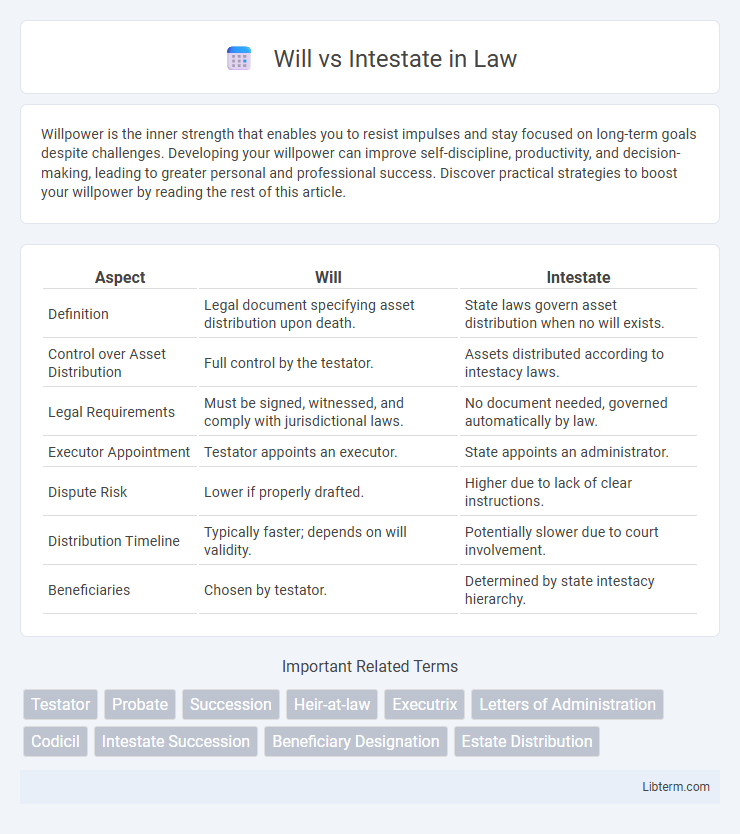Willpower is the inner strength that enables you to resist impulses and stay focused on long-term goals despite challenges. Developing your willpower can improve self-discipline, productivity, and decision-making, leading to greater personal and professional success. Discover practical strategies to boost your willpower by reading the rest of this article.
Table of Comparison
| Aspect | Will | Intestate |
|---|---|---|
| Definition | Legal document specifying asset distribution upon death. | State laws govern asset distribution when no will exists. |
| Control over Asset Distribution | Full control by the testator. | Assets distributed according to intestacy laws. |
| Legal Requirements | Must be signed, witnessed, and comply with jurisdictional laws. | No document needed, governed automatically by law. |
| Executor Appointment | Testator appoints an executor. | State appoints an administrator. |
| Dispute Risk | Lower if properly drafted. | Higher due to lack of clear instructions. |
| Distribution Timeline | Typically faster; depends on will validity. | Potentially slower due to court involvement. |
| Beneficiaries | Chosen by testator. | Determined by state intestacy hierarchy. |
Understanding Wills: Definition and Importance
A will is a legal document that specifies how a person's assets and property should be distributed upon their death, ensuring their wishes are honored and reducing potential family disputes. Understanding the importance of a will helps secure beneficiaries' rights, appoint executors, and minimize probate delays. Without a valid will, intestate laws govern asset distribution, often leading to unintended outcomes based on statutory priorities rather than personal preferences.
What Does Intestate Mean?
Intestate refers to the condition of dying without a valid will, meaning the deceased's estate is distributed according to state laws rather than personal wishes. When a person dies intestate, the court appoints an administrator to manage the estate and follows intestacy laws to allocate assets among surviving relatives. These laws prioritize spouses, children, and closest family members, often resulting in outcomes that differ significantly from what the deceased might have intended.
Key Differences: Will vs Intestate
A will is a legal document that explicitly outlines the distribution of a person's assets upon death, designating beneficiaries and appointing executors, while intestate refers to dying without a valid will, triggering state laws to determine asset allocation. Intestate succession laws prioritize spouses, children, and close relatives according to specific statutes, often leading to unintended or disputed inheritances. The key difference lies in control and clarity: wills provide precise, customizable instructions to ensure wishes are honored, whereas intestacy results in default legal procedures that may overlook personal intentions.
Legal Implications of Dying Without a Will
Dying without a will, known as intestacy, triggers state-specific probate laws that dictate asset distribution, often prioritizing spouses and blood relatives over friends or charities. Intestate estates typically face prolonged legal processes, increased court involvement, and potential disputes among heirs, which can deplete estate value. The absence of clear directives can also result in unintended beneficiaries receiving assets, complicating legacy planning and family dynamics.
The Probate Process for Wills and Intestacy
The probate process for wills involves validating the testamentary document, appointing an executor, and distributing assets according to the decedent's specified wishes. In intestacy, courts appoint an administrator to manage estate distribution based on statutory inheritance laws when no valid will exists. Probate for intestate estates often takes longer due to the need for asset identification and beneficiary determination under intestacy rules.
Who Inherits When There Is No Will?
When an individual dies intestate, state laws of intestate succession determine who inherits the estate, prioritizing spouses, children, and close relatives. Typically, the surviving spouse receives a significant portion or all of the estate if there are no descendants, while children inherit equally if no spouse exists. Extended family members such as parents, siblings, or cousins may inherit only if no spouse or children survive.
Benefits of Having a Valid Will
A valid will ensures the clear distribution of assets according to the testator's wishes, minimizing family disputes and legal challenges. It allows the appointment of executors and guardians, providing control over estate management and care for minor children. Without a will, intestate succession laws dictate asset division, often resulting in delays and unintended beneficiaries.
Common Challenges in Intestate Succession
Intestate succession often leads to complex legal disputes due to the absence of a valid will, causing delays in asset distribution and increasing probate costs. Challenges include identifying rightful heirs, especially in blended families or when distant relatives claim inheritance, resulting in contested claims and potential litigation. The lack of clear instructions may also lead to unintended beneficiaries receiving assets, undermining the decedent's presumed wishes.
Steps to Create a Legally Binding Will
Creating a legally binding will involves several key steps: first, clearly identify the testator and declare the document as their last will. Next, specify the distribution of assets, appoint an executor, and name guardians for minor children if applicable. Finally, the will must be signed in the presence of witnesses who also sign the document, ensuring compliance with state-specific legal requirements.
Protecting Your Legacy: Will Planning Tips
Creating a comprehensive will ensures your assets are distributed according to your wishes, preventing intestate succession laws from dictating your estate's division. Including clear beneficiary designations and appointing a reliable executor safeguards your legacy and minimizes family disputes. Regularly updating your will accommodates life changes and helps maintain control over your estate's future.
Will Infographic

 libterm.com
libterm.com